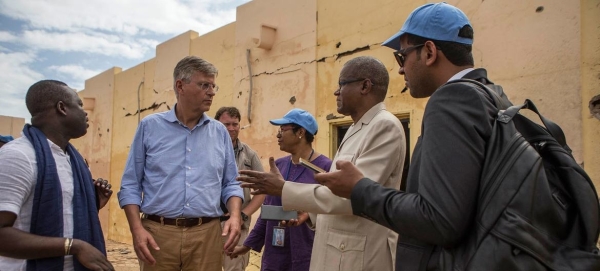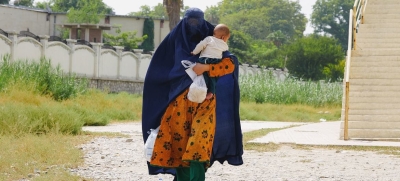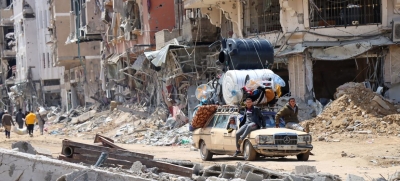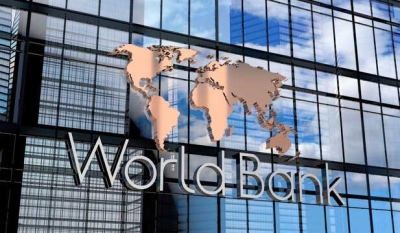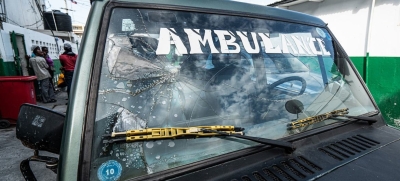UN peacekeeping missions in Sub-Saharan Africa are operating under more challenging political and security conditions due to a multiplication of crises and a “climate of division” amongst Member States, particularly in the Security Council. That’s according to the head of UN Peacekeeping, Jean-Pierre Lacroix.
The 10-year-old mission in Mali, MINUSMA is currently winding down ahead of its end of December deadline to leave.
In his speech to the UN General Assembly in September this year, Félix-Antoine Tshisekedi Tshilombohe, President of the Democratic Republic of the Congo, called for the UN peacekeeping mission, MONUSCO, to begin its withdrawal from the country.
Africa remains the chief focus of peacekeeping operations in terms of the number of missions and personnel deployed.
Mr. Lacroix sat down with UN News to discuss the state of peacekeeping on the continent.
UN News: You’ve just returned from a visit to Mali, where the mission, MINUSMA, is in the process of closing. How is the drawdown going?
Jean-Pierre Lacroix: The drawdown is quite well advanced. We have more than 10,000 colleagues who have already left Mali out of a total of slightly more than 13,500. So, we’re on the way to completing this drawdown by the 31st of December as planned.
I was in Mali essentially to thank our colleagues for all their good work; they have been very active in providing protection to civilians. During my many visits to Mali, to those places where our MINUSMA colleagues were deployed to protect civilians, the feedback from the local population was always very positive and grateful and indeed, if there was any demand from them, it was that we should stay and do more.
UN News: So, is this the right time to leave?
Jean-Pierre Lacroix: It is a decision of the Malian authorities, and this has been then endorsed by the Security Council. And, of course, a UN mission, whether it’s peacekeeping or another type of mission, cannot operate if it does not have the support of the host government.
So, it had to happen, and I think that the key challenge was to make sure the withdrawal would happen in a way that would ensure the safety and security of our personnel.
UN News: What’s the status of the other peacekeeping missions in sub-Saharan Africa? Will they continue to operate?
Jean-Pierre Lacroix: I think that most of our peacekeeping missions are operating under more challenging political and security conditions. I believe that the multiplication of crises, and the more exacerbated divisions across the Member States, makes it more difficult for us to operate, especially because political efforts in this climate of division and tension are not making enough progress.
So, tensions at the global level also are reflected at the local level. However, the protection of civilians remains very active; every single day hundreds of thousands of civilians depend on our peacekeepers for their protection.
There are challenges. Sometimes there are difficulties with the host government; there are frustrations because expectations, particularly when it comes to our protection of civilians mandate, are very high.
And we cannot always meet these expectations because of the situation on the ground, and because of the resources that we are given.
UN News: In addition to these political and security issues UN peacekeeping is facing financial pressures as well. You’ve just returned from a biennial ministerial meeting focused on peacekeeping in Ghana. Did you receive the support from Member States that you were seeking?
Jean-Pierre Lacroix: Absolutely, yes. The meeting in Accra, the first of its type in Africa, was very successful. We received very significant pledges from Member States, which are consistent with our needs. This demonstrates that peacekeeping as a UN activity benefits from a very wide support from our Member States.
Indeed, I believe that it is probably one of the most supported activities in the UN because most of the Member States are stakeholders, whether they are troop or police-contributing countries, members of the Security Council or General Assembly, or countries with an interest in the particular situation where our peacekeepers are deployed.
I think there was a recognition of the added value of our peacekeepers and of the fact that if we didn’t have those peacekeeping operations, the situation would probably be much worse in those countries and regions.
UN News: The landscape of insecurity in Africa is changing rapidly. How is UN peacekeeping adapting to that change?
Jean-Pierre Lacroix: I think it’s important to note that peacekeepers seriously mitigate the impact of this widespread insecurity in many areas in Africa. If you look at some of the countries or regions where we no longer have peacekeepers, for example Darfur, it should give us reason to pause and to think about the added value of peacekeepers.
Safety and security challenges are indeed increasing, and we absolutely need to step up the efforts to respond to these challenges now. There are many ways to do this, including improving engagement and building trust with communities.
It’s very important to explain what we’re doing, why we’re there, and to be effective in delivering our mandate to counter the increase in fake news and disinformation. Because there are groups with vested interests which are not interested in our success, or which are actually interested in peacekeeping failing.
They’re interested in preserving chaos because that benefits these groups and their vested interests.

UN News: You mentioned Darfur. How concerned are you that once UN peacekeepers leave a particular region or country, that the same old problems of insecurity and violence and chaos are going to occur?
Jean-Pierre Lacroix: It is a concern. The ideal situation is for a peacekeeping operation to leave after the successful completion of a political process, when a durable political solution has been achieved with the support of peacekeepers. We rely on the support of the Security Council, Member States as well as regional and subregional organizations and many other players.
UN News: And you’re not getting that right now?
Jean-Pierre Lacroix: Well, yes, we did in many countries in the past, these durable solutions were achieved with the support of peacekeepers. The list in Africa is very long and includesMozambique, Namibia, Angola, Sierra Leone, Côte d’Ivoire, Liberia.
But it’s much more difficult to achieve those outcomes now because of the lack of united and committed support for those political efforts, particularly from our divided Member States. I think this is really a key challenge that we’re having to deal with.

UN News: We’re talking about the divisions in the Security Council?
Jean-Pierre Lacroix: Division in the Security Council, division across the membership, divisions in the international community, which reverberate in the different areas where our peacekeepers are deployed.
UN News: How do you see that playing out in the future? If this division continues, how is it going to affect peacekeeping?
Jean-Pierre Lacroix: We need to be clear that the role of the UN is not just in peacekeeping but also across peace and security and this can only be as strong and effective as the commitment, support, and unity of Member States.
That doesn’t mean that we should not keep making efforts to improve how we operate our peacekeeping missions and more generally our field-based operation on peace and security. But at the same time, we need to make it clear to our member states that our success ultimately is predicated on the amount of united support that we’re getting from them.
There has to be an appetite and a commitment from our Member States for multilateral responses to crises.

